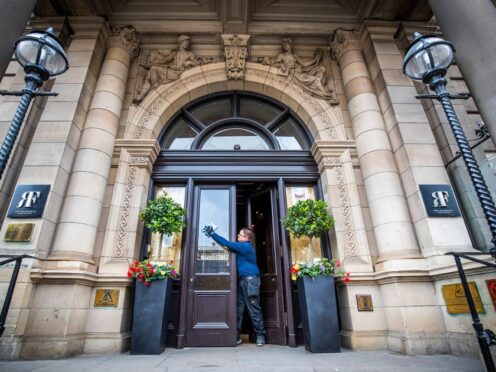Council leaders are calling on Holyrood to accelerate plans to give them the power to introduce a charge on overnight stays.
MSPs will this week back legislation giving local authorities the ability to set a visitor levy for those spending the night in hotels and other forms of accommodation, but councils said the waiting time before they can apply the charge is “disproportionate and excessive”.
Local government leaders in Cosla have lobbied MSPs on the issue ahead of Tuesday’s final debate and vote on the Visitor Levy (Scotland) Bill.
Leaders of Edinburgh City Council have already said they want to be the first in Scotland to introduce the levy.
But Cosla said as it stands, no local authority will be able to apply a visitor levy before 2026.

That is because councils will have to wait 18 months after consulting on plans for a levy before being able to introduce it.
In a briefing paper, Cosla said: “This is clearly both disproportionate and excessive.
“After years of successive cuts to areas such as infrastructure, culture and leisure, the services and facilities crucial to both our communities and local visitor economies require the additional revenue which would be reinvested from a visitor levy scheme now.”
Councils are now urging MSPs to back amendments to the Bill which would reduce the lead-in time, saying this will “ensure that our communities and visitor economies see crucial investment as soon as possible”.
As it stands, the legislation will allow councils to charge a visitor levy on those staying in a range of accommodation, including hotels, hostels, bed and breakfasts, self-catering properties, campsites and caravan parks.
Councils are also keen to see it expanded to cover those staying on cruise ships, arguing they “access the same services and facilities” as those using other forms of accommodation.

Cosla said its officials have been “working closely” with the Scottish Government to address this, with the local government body urging MSPs to back amendments to the Bill which would introduce cruise ship levy powers.
In addition, it said MSPs should oppose amendments to the Bill which would allow ministers to set a national cap on how many nights a levy could be applied for, with Cosla saying this “unnecessary national direction” would “constrain local flexibility” for councils.
It also said the issue of exemptions from the Bill should “remain a key local decision” to be made by councils in consultation with residents and businesses.
As a result, Cosla called on MSPs to oppose amendments to Bill that would introduce national exemptions.
A Scottish Government spokesman said: “A visitor levy will be a force for good, giving councils the opportunity to reinvest the money they raise in facilities and services largely used by visitors.
“Enabling councils to charge a levy in their area if they wish would also be a significant step towards empowering local government and strengthening local democracy.
“The Scottish Government has been engaging with the tourism industry and other stakeholders on the proposed levy for a number of years and continues to work with them as part of an expert advisory group.
“A lead-in time provides the space for businesses to put in place systems and train staff so they can collect the levy and remit it to the local authority. This has been a key ask from the accommodation industry and was supported by 16 of the 18 local authorities that responded.
“The Scottish Government is open to giving local authorities the power to create a cruise ship levy. We are continuing to examine how best to take this forward working in partnership with Cosla and local government.”
